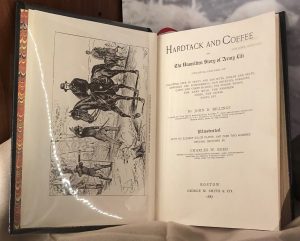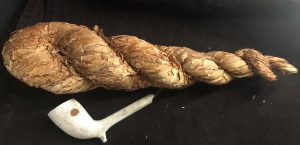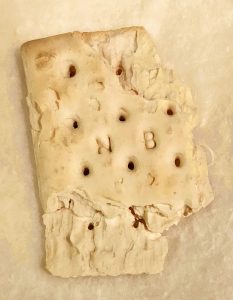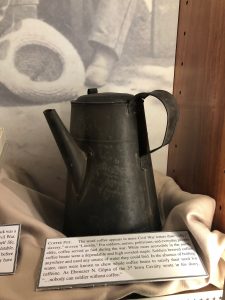Hardtack and Coffee: The Unwritten Store of Army Life by John D. Billings
 Published in 1887, Hardtack and Coffee is a memoir by John D. Billings, a veteran of the 10th Massachusetts Light Artillery Battery. Billings brutally honest account of life in the military during the Civil War is considered one of the most significant memoirs by a Civil War veteran.
Published in 1887, Hardtack and Coffee is a memoir by John D. Billings, a veteran of the 10th Massachusetts Light Artillery Battery. Billings brutally honest account of life in the military during the Civil War is considered one of the most significant memoirs by a Civil War veteran.
Tobacco Twist and Pipe
As one of the most important American commodities at the time of the Civil War, tobacco use was universal throughout the United States. Whether smoked, chewed, or used as “snuff,” tobacco was an indulgence for men, women, and children alike.
Cribbage Board, 1864
Played with a pack of cards, cribbage uses a board and pegs to keep score. This board was carved by 1st Lt. Leander J. Skinner of the 2nd New Hampshire Infantry during his time as a prisoner of war at Camp Oglethorpe in Macon, GA.
Playing Cards
First published in 1861, The Author’s Game consists of eleven sets of four cards each representing the works of eleven authors. The object is to form complete sets of the four cards comprising the works of one author.
Hardtack
Made of flour and water with a bit of salt or sugar, hardtack was a cracker or biscuit-like food that served as a staple ration during the Civil War. Baking each cracker until it was as hard as possible ensured a long shelf life, making it a practically non-perishable source of sustenance. To make it palatable, soldiers were required to soften each cracker in coffee or water before consumption. Soaking hardtack also helped release insect larvae that may have infested poorly stored provisions.
Coffee Pot
The word coffee appears in more Civil War letters than “rifle,” slavery,” or even “Lincoln.” For soldiers, nurses, politicians, and everyday people alike, coffee served as fuel during the war. While more accessible in the north, coffee beans were a dependable and high coveted staple. Soldiers brewed coffee anywhere and used any source of water they could find. In the absence of boiling water, men were known to chew whole coffee beans to satisfy their need for caffeine. As Ebenezer N. Gilpin of the 3rd Iowa Cavalry wrote in his diary, “…nobody can soldier without coffee.”




